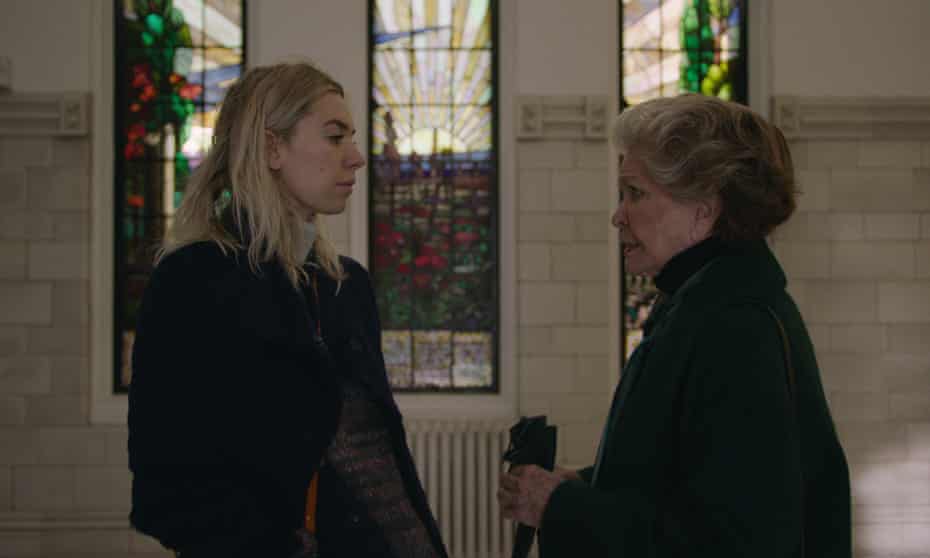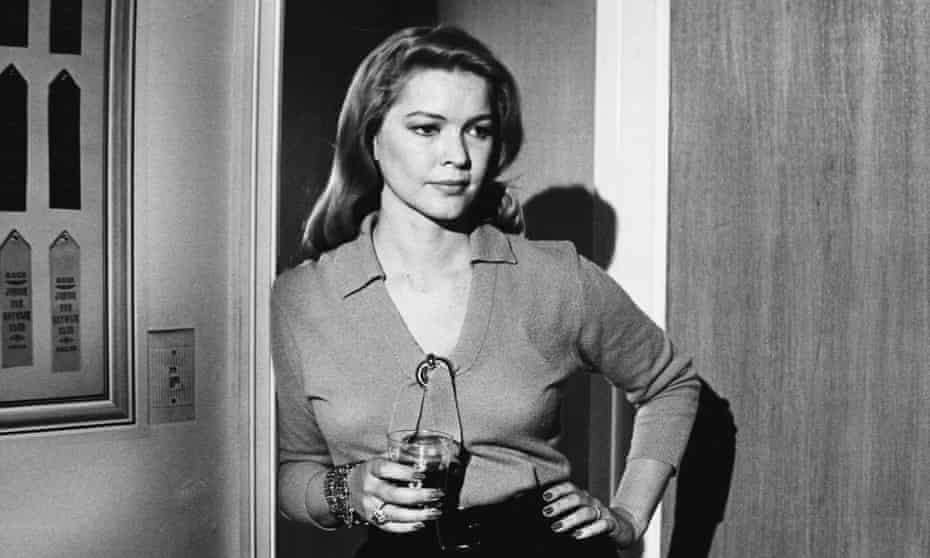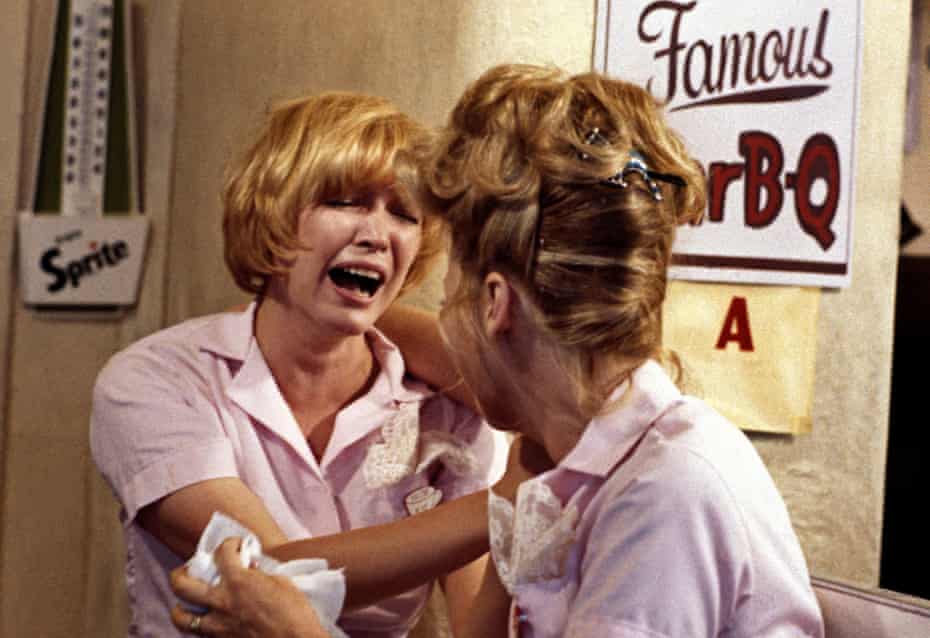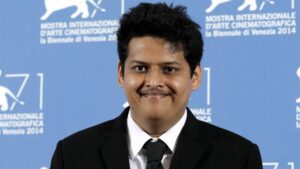As she prepares to smash an Oscar record, the great actor talks about drawing on her own suffering, missing her violent mother – and surviving the Hollywood ‘hamburger machine’

Ellen Burstyn is struggling to make herself heard above the sirens that are screeching across the city. “I live on a road that’s very popular with police cars and ambulances,” she says down the line from New York. She had been trying to tell me about the Oscars when she was interrupted by the racket. If she is nominated in March – and, with the odds of her winning best-supporting actress currently at 5/1, she almost certainly will be – this would make her the Academy’s oldest acting nominee, having turned 88 this month. “At the moment, it’s Chris Plummer,” she says excitedly. “But I would beat him by 42 days! What a great crown that would be to wear.”
If her performance in the Netflix drama Pieces of a Woman wins her a nomination, it will be her seventh. Over the last 50 years, Burstyn has been recognized for her portrayals of a jaded wife in The Last Picture Show; of a mother whose child is demonically possessed in The Exorcist; and of a widowed waitress who hits the road with her young son in Alice Doesn’t Live Here Anymore. In Same Time, Next Year, she played a married woman who meets annually with her lover; in Resurrection, she was a car crash survivor who acquires healing powers; and in Requiem, for a Dream, she starred as the mother of a junkie who becomes an addict herself.
Related Posts
Her sole win was for Alice, where the range of her performance still astonishes, running from distress and desolation to joy and outright comic pizzazz. Busy on Oscar night with the Broadway run of Same Time, Next Year, she sent Alice’s director Martin Scorsese to collect the award in her stead.
In truth, she was relieved not to go. “I’m never really comfortable there. Everyone in borrowed gowns, smiling down the red carpet and being interviewed about, oh, I don’t know. But it’s not this kind of conversation, I can tell you. ‘Whose dress are you wearing? Whose diamonds?’” Attending is fine, she thinks, if the odds are against you. “I’ve gone other years when I felt more confident that I wouldn’t win. Whereas with Alice, I was not surprised that I won.” She lets slip a naughty laugh, perhaps realizing that this might come across as less than humble. Her rivals at the 1975 ceremony included Gena Rowlands for A Woman Under the Influence and Faye Dunaway for Chinatown. The competition will be stiff again if Burstyn is nominated next year, as she is likely to be up against Amanda Seyfried for Mank, and Olivia Colman for dementia drama The Father.
It was Burstyn who picked Scorsese to direct Alice, back in 1973 when her stock was far higher than his. Warner Bros, dazzled by how good she was in the dailies from The Exorcist, offered her any script she wanted. Seizing on Alice, which had once been proposed as a vehicle for Diana Ross, Burstyn then selected Scorsese, fresh from Mean Streets, to lend the project his freewheeling, improvisatory energy.
I have the impulse to call my mother often. I say it out loud sometimes: ‘Mom, I wish I could call you’
Now, in what might be interpreted as a pleasing act of reciprocation, the director has lent his name to Pieces of a Woman as executive producer – “To make sure the film gets seen”, as Burstyn puts it. She plays Elizabeth, a steely matriarch with a clenched and joyless smile, who pressures her grieving daughter Martha to testify against a midwife after the death of her baby. Hair lacquered into a kind of crash helmet, Elizabeth charges head-first at life, refusing to allow fate the upper hand. The film’s indisputable highlight is a ferocious, eye-popping exchange between mother and daughter. As Martha, played by Vanessa Kirby, wavers over appearing in court, Elizabeth tries to tip the scales with a story about her own past – about her birth, in fact, during the Holocaust, when a doctor advised her mother to simply throw her away.
“That speech kept growing,” she says. “Before I did my take, Vanessa said, ‘Convince me.’ Because her character had been resistant to the idea of court. I did the speech the way it was and then, just as I finished, I had the realization that I had not convinced her as needed. So I carried on talking, and I did that part about, ‘Speak your truth, tell them how it is for you.’ How I said it, I don’t remember. It just came out of me. I was in the scene, you know? The fiction was the reality at that point. When I got to the end, I felt I had, in fact, made her want to go to court.”

In her 2006 memoir, Lessons in Becoming Myself, Burstyn explains that her preparation for any role involves “taking an elevator down to my inner archive, where I quietly flip through the files until some memory rises up and offers itself”. What did she find down there that was relevant to Elizabeth? “You know, I never talk about that,” she says. “If I do, it loses its power. Personal memories are like tools I can call on for help. If I give it away to you, it won’t work for me anymore, so I won’t answer that.” The elevator doors close firmly on the subject.
She will confirm, though, that she has never resorted to the sort of harsh tactics that Elizabeth employs, swatting obstacles away with her checkbook. At one point, she tries to bribe her daughter’s partner, played by Shia LaBeouf, to leave town forever. “I doubt I would ever do that,” she laughs. “It would have to be extreme circumstances.”
Speaking prior to the recent allegations about LaBeouf’s abusive behavior, Burstyn is full of praise for her co-star. “Shia is so fierce about being real. He isn’t a standard-issue.” I remind her that he once appeared on the red carpet at the Berlin film festival wearing a paper bag with the words “I Am Not a Celebrity” daubed on it. “Oh, I read about that,” she says. “I never quite understood it.” Has fame ever been a burden for her? “I’ve never been one of those celebrities who got chased down the street by shouting throngs. People are always very nice to me. It hasn’t been at all unpleasant.”

The same can’t be said of her life. Burstyn’s childhood in Detroit was marked by abuse of every kind, not least from her violent mother. “I’m surprised by how much I miss her these days, having had such a difficult relationship with her,” she says. “I have the impulse to call her very often. I say it out loud sometimes, ‘Mom, I wish I could call you.’” What would she say? “I think it’s just to go back over the past. I wish I could’ve been more helpful then and understood her point of view, rather than resisting. It would be nice to be able to talk to her about that now. And I do talk. I talk to the mother that lives inside of me.”
Hold on, I’m getting a call from Alec Baldwin. Don’t go anywhere
How did the way she was raised affect her own parenting? “Well, I remember when I was a child having a mental notebook where I would say, ‘I’ll never do that when I’m a mother.’ I would make notes about what a good mother should and shouldn’t be. I think my son would tell you I was a very good mother. I’m sure if my mother and I could sit down and talk about it today, she would say she was sorry. Years later, when I was already an adult, I talked to her about being hit so much. I told her this was not a good thing. She said, ‘I’d never do it again, I’ll tell you that. Not now I know how much trouble it caused.’” She pauses. “I’m glad she understood that before she left.”
Learning to “abide trouble and suffering”, she says, has stood her in good stead as an actor. “Otherwise you’re afraid to haul up those uncomfortable things in your work.” She trained at the Actors Studio in New York in the late 1960s after realizing that she didn’t want the glitzy, fluffy star roles that lay ahead for her on the path she had been following for 10 years. She craved the tough stuff. She didn’t have to be Debbie Reynolds: she could be Marlon Brando.
Burstyn is still intimately involved with the Actors Studio. In fact, she has to field a call from one of her co-directors in the middle of our conversation, to discuss an upcoming board meeting. “Hold on, I’m getting a call from Alec Baldwin,” she says. “Don’t go anywhere.” Her stint there, under Lee Strasberg, led directly to the string of films, including The Last Picture Show and The Exorcist, that transformed her career – and the whole of US cinema. If she is rarely invoked alongside Warren Beatty, Robert De Niro, Jack Nicholson, and Al Pacino as one of the faces of the American new wave, it can only be because she is, rather inconveniently, a woman.

Casual moviegoers can recite those very masculine monologues from Taxi Driver, Five Easy Pieces, or Network. Less familiar but every bit as scalding is the scene in The King of Marvin Gardens, from 1972, in which Burstyn offers her makeup, clothes, and a few freshly-snipped locks of hair to a bonfire on the beach at Atlantic City. “They’re made out of mink hairs, did you know that?” she says as she sprinkles her false eyelashes on to the flames. “For 20 years, I’ve been wearing animal hairs on my face.”
The sight of a woman dealing fearlessly on-screen with age, decaying beauty, and disappointment was a chastening one, more uncomfortable for many than the male equivalent. Burstyn’s experiences also prove that a woman has far less cultural credit in the bank when things go awry. All the industry clout she had built up during the 1970s evaporated after a pair of box-office flops: Same Time, Next Year, and Resurrection. Two strikes and she was out, more or less, consigned for around 15 years to television, in the days when this was not a prestigious place to be. “That was it, girl, you know!” she said in an interview in 2000. “It’s a sin to have your films not make money.”
Audacious directors who grew up on her work came eventually to the rescue, calling on her unusual capacity for being both benign and barbed, in films as diverse as The Yards, Requiem for a Dream, Interstellar, and Wiener-Dog. She has had few opportunities, though, to be as loose and funny on film as she was in Alice. There has been plenty of slush in her career (The Spitfire Grill, Playing by Heart, Divine Secrets of the Ya-Ya Sisterhood) but a distinct dearth of laughs, unless you count the preposterous remake of The Wicker Man, where she presided gleefully over the torture-by-bees and eventual immolation of Nicolas Cage.
The vital thing is that she survived Hollywood, a place she once described as a “hamburger machine”. How did she avoid being turned into mince? “It was never really my intention to be a movie star,” she says. “I always wanted to be as good as I could possibly be. That kind of goal leads you in a different direction to wanting to be a star, which can be a frightful experience. The fact that I’m still working at 88 tells me I did what I wanted to do.” The sirens have stopped wailing now. Calm settles over the city.
• Pieces of a Woman is in cinemas now and on Netflix from 7 January.
Guardian / Balkantimes.press
Napomena o autorskim pravima: Dozvoljeno preuzimanje sadržaja isključivo uz navođenje linka prema stranici našeg portala sa koje je sadržaj preuzet. Stavovi izraženi u ovom tekstu autorovi su i ne odražavaju nužno uredničku politiku The Balkantimes Press.
Copyright Notice: It is allowed to download the content only by providing a link to the page of our portal from which the content was downloaded. The views expressed in this text are those of the authors and do not necessarily reflect the editorial policies of The Balkantimes Press.



